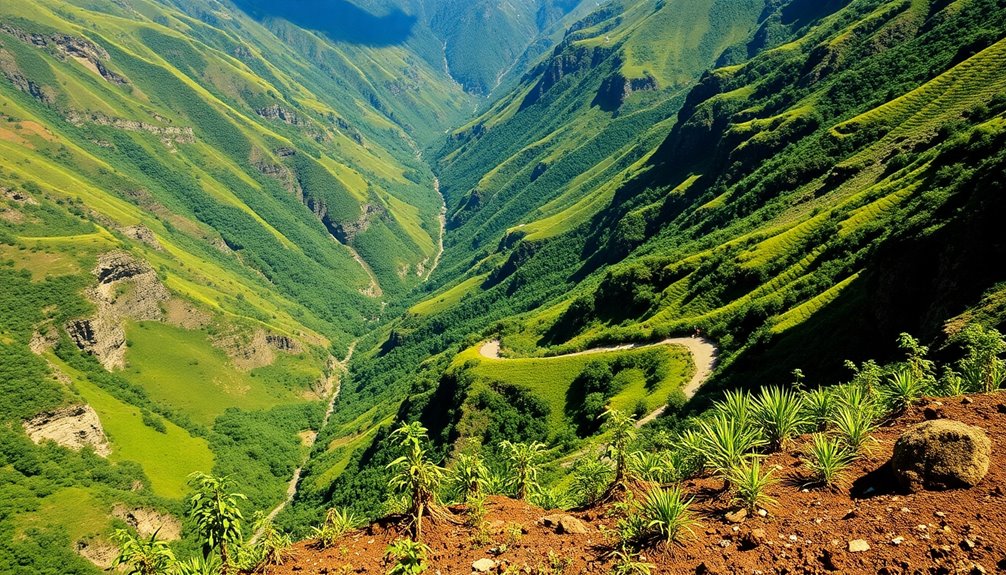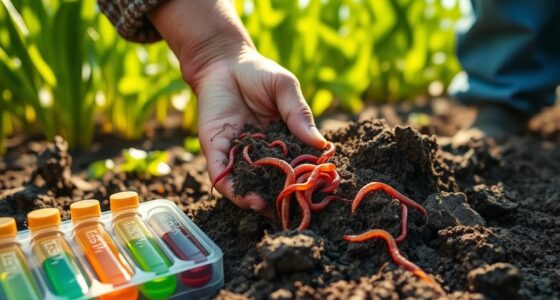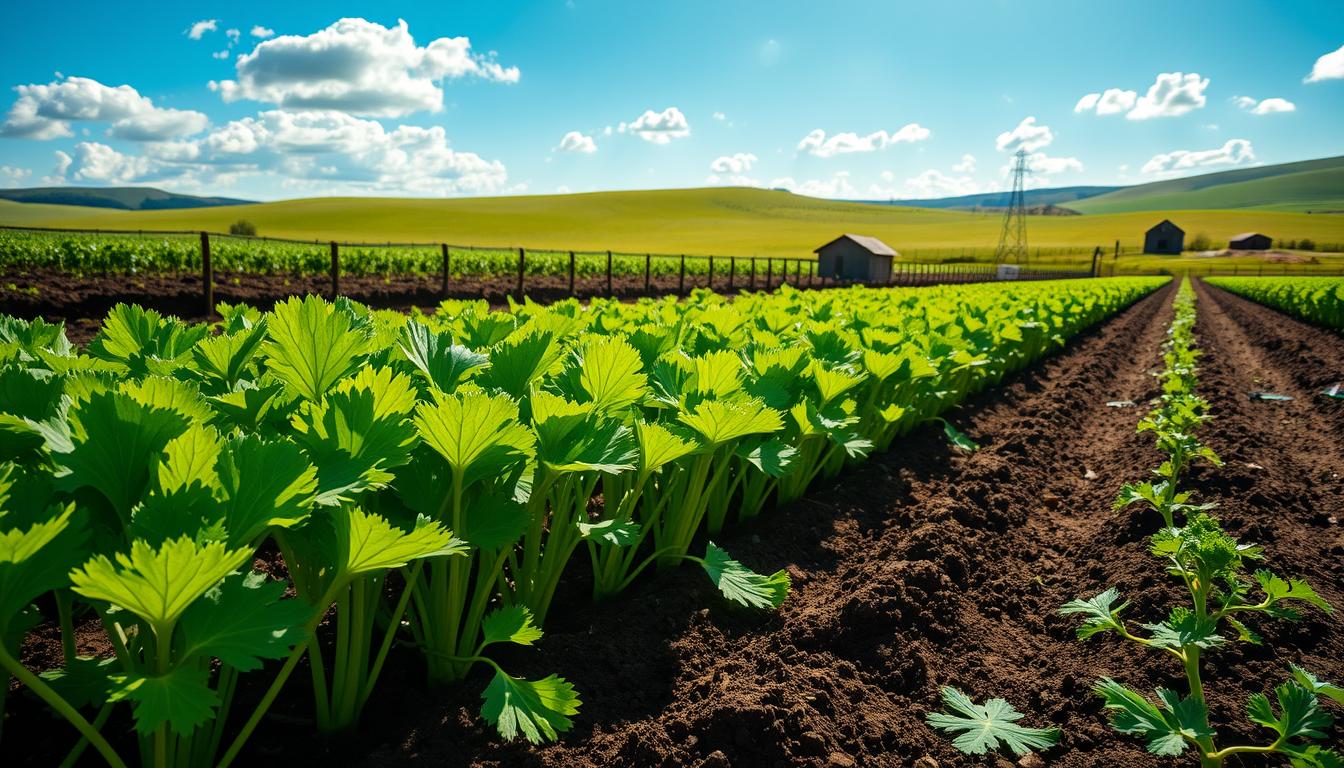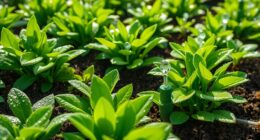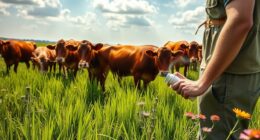Plantation farming is best described as an intensive agricultural practice. You'll notice that it focuses on large-scale monoculture, which maximizes crop output with high labor and capital inputs. It relies heavily on fertilizers, pesticides, and a significant workforce to maintain productivity. This method allows for efficient large-scale production but comes with challenges, such as environmental impacts and market fluctuations. Given its reliance on specific cash crops, it creates both economic benefits and vulnerabilities. If you're curious about the sustainable practices and future trends in plantation farming, there's plenty more to explore.
Key Takeaways
- Plantation farming is classified as intensive due to high input levels and focus on maximizing yields per unit area.
- It predominantly employs monoculture practices, which enhance efficiency but can lead to environmental degradation.
- Extensive use of fertilizers, herbicides, and pesticides is common to achieve higher crop outputs in plantation farming.
- Economies of scale in plantation farming contribute to profitability but also increase vulnerability to market fluctuations.
- The adoption of sustainable practices is essential to mitigate the negative environmental impacts of intensive plantation farming.
Understanding Plantation Agriculture
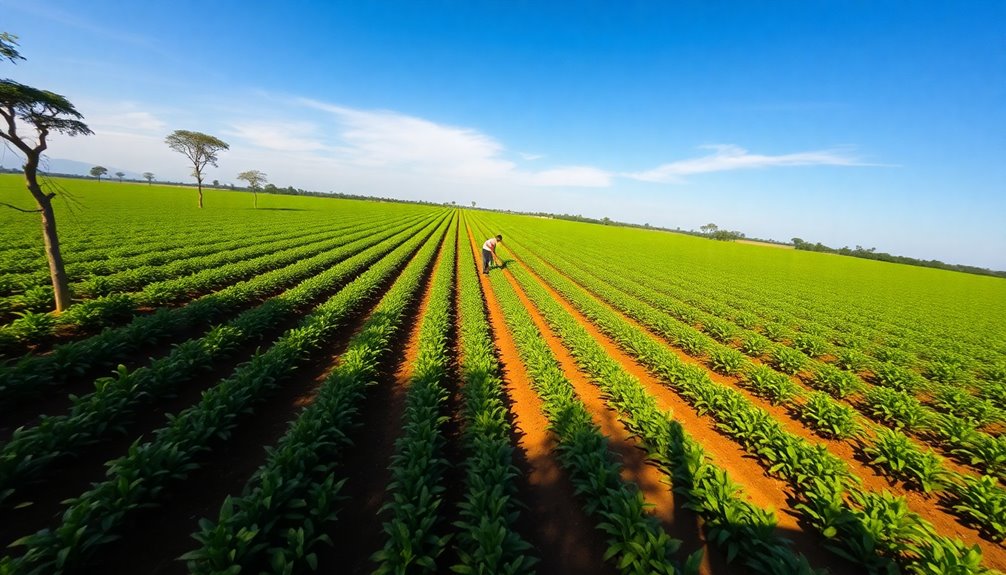
Plantation agriculture, often seen as a cornerstone of cash crop production, relies heavily on high levels of capital and labor to maximize yields. This intensive farming practice focuses on cultivating a single cash crop, such as rubber, sugarcane, tea, or coffee, in tropical and subtropical regions where conditions favor monoculture.
You'll notice significant capital investments in land, machinery, fertilizers, and a large workforce to sustain high production levels. While plantation agriculture generates employment and contributes to global trade, it also brings economic benefits to developing countries through exports.
However, the reliance on intensive farming leads to environmental challenges, such as soil degradation and biodiversity loss, raising concerns about the long-term sustainability of this agricultural practice. Additionally, understanding the importance of diversification in agricultural practices can help mitigate some of these environmental impacts.
Characteristics of Intensive Farming

Intensive farming showcases a dynamic approach to agriculture, where high capital and labor inputs per unit area drive maximum yields and profitability.
This method often involves monoculture practices, focusing on a single crop cultivated extensively to enhance efficiency and output.
You'll notice that intensive farming frequently employs multi-cropping and crop rotation, which can greatly boost productivity compared to other farming methods.
To maximize results, you'll find the widespread use of fertilizers, herbicides, and pesticides aimed at increasing crop yields and effectively controlling pests.
While this approach requires substantial upfront costs for land, machinery, and labor, it results in economies of scale that facilitate large-scale production, making it a compelling choice for many farmers seeking profitability in today's agricultural landscape.
Comparison With Extensive Agriculture
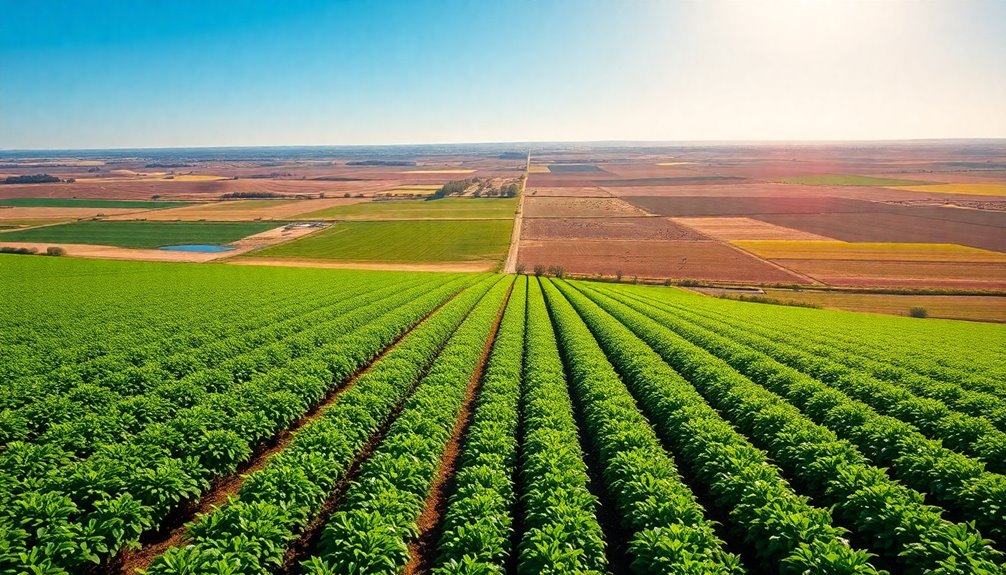
When comparing plantation farming to extensive agriculture, you'll notice distinct differences in their approaches to land use and input management.
Plantation farming is a form of intensive agriculture, characterized by high capital and labor inputs per unit area. This method focuses on maximizing yield through practices like monoculture and advanced technology.
In contrast, extensive agriculture uses larger land areas with lower inputs and yields, leading to less vulnerability to price fluctuations and climate change.
While plantation agriculture demands a substantial workforce and generates significant employment, it can also cause environmental issues like soil degradation.
Extensive agriculture often employs more sustainable practices, balancing productivity with ecological health, making it a resilient alternative to intensive agricultural methods.
Capital Requirements Explained

Typically, plantation farming demands a substantial capital investment to get started. Understanding the capital requirements is vital for anyone considering entering this sector.
Here are some key areas where you'll need to allocate funds:
- Land Acquisition: Purchasing or leasing large areas of land can be costly.
- Machinery: Investing in tractors, harvesters, and other equipment is essential for efficiency.
- Irrigation Systems: Reliable water supply systems are necessary to maintain crop health.
- Labor Costs: A sizable workforce is needed to manage extensive operations and guarantee high yields.
These capital requirements can create vulnerabilities, especially if market prices fluctuate or adverse conditions arise.
Knowing this helps you prepare better for the challenges ahead in plantation agriculture.
Economic Benefits of Plantations
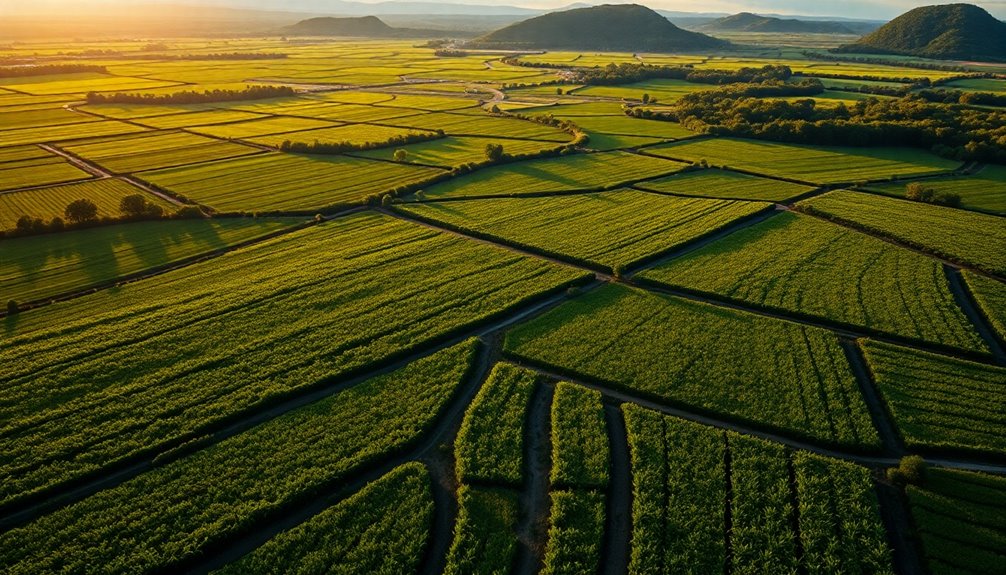
Plantation farming offers significant economic advantages that extend beyond the initial capital investments outlined earlier.
By focusing on cash crops like coffee and sugar, plantation agriculture generates substantial foreign exchange for developing countries, often making these commodities top exports. This sector provides millions of jobs, supporting rural economies and enhancing livelihoods.
With high capital investment in machinery and infrastructure, plantations achieve economies of scale, boosting production efficiency and overall profitability.
While reliance on cash crops can expose local economies to global market fluctuations, the contributions to agricultural GDP and integration into global trade networks play an important role in economic development.
Consequently, plantations not only strengthen local economies but also elevate the economic standing of entire nations.
Environmental Challenges Faced

When you think about plantation farming, it's hard to ignore the environmental challenges it brings.
Soil degradation, biodiversity loss, and pollution are just a few issues that arise from these intensive practices. As plantations expand, they often compromise the very ecosystems that support life, raising urgent concerns for our planet's future.
Soil Degradation Issues
Soil degradation stands as a significant challenge in plantation farming, primarily driven by practices like monoculture that strip the land of essential nutrients. This degradation can lead to severe consequences for agricultural productivity.
Here are some key issues you should be aware of:
- Nutrient depletion: Continuous monoculture reduces soil fertility and essential nutrients.
- Soil contamination: Heavy use of chemical fertilizers and pesticides harms soil health and decreases organic matter.
- Soil erosion: Land clearing for cash crops strips away protective vegetation, leading to topsoil loss.
- Salinization: Intensive irrigation practices cause salt accumulation, impairing plant growth.
Addressing soil degradation is important for sustainable plantation farming and long-term agricultural success. Additionally, integrating practices like diversifying crop types can help mitigate some of the negative effects of soil degradation.
Biodiversity Loss Concerns
In the domain of agriculture, biodiversity loss poses a critical environmental challenge, especially within plantation farming. When you rely on monoculture practices, vast areas are cultivated with a single crop, which leads to habitat loss for many species.
The extensive use of pesticides further exacerbates biodiversity loss, harming beneficial insects, birds, and aquatic life. Deforestation for plantations disrupts ecosystems, causing native flora and fauna to vanish and diminishing genetic diversity.
Additionally, the introduction of invasive species can outcompete local species, threatening biodiversity and altering ecosystem dynamics. Studies show that regions with intensive plantation agriculture often see a decline in overall species richness, which directly impacts essential ecosystem services like pollination and soil health.
Pollution and Contamination Risks
Plantation farming frequently poses significant pollution and contamination risks that can harm both the environment and public health.
These risks stem from various practices that can lead to severe consequences:
- Pesticide and Fertilizer Use: Heavy reliance on chemicals leads to soil and water pollution, affecting local ecosystems.
- Monoculture Practices: These increase pest susceptibility, driving the need for more chemical treatments that can contaminate surrounding areas.
- Runoff Issues: Harmful chemicals can wash into nearby water bodies, causing eutrophication and endangering aquatic life.
- Deforestation Effects: Expanding plantations often results in habitat loss, disrupting biodiversity and local ecosystem balance.
Future of Plantation Farming
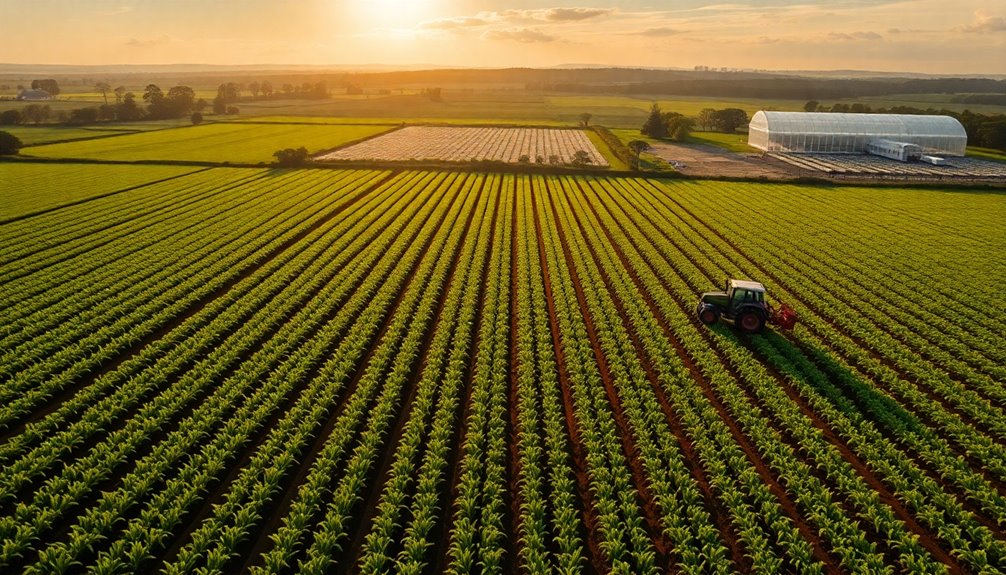
As we look ahead, the future of plantation farming is set to transform considerably, driven by sustainable practices and technological innovations.
You'll notice an increasing focus on mitigating environmental impacts through agroforestry and integrated pest management techniques. Precision agriculture and smart irrigation systems will likely enhance agricultural production, boosting productivity and resource efficiency.
With global demand for cash crops on the rise, diversifying crop varieties will help you reduce vulnerability to market fluctuations. Climate change presents challenges, but resilient crop varieties and adaptive management strategies will guarantee long-term viability.
Additionally, integrating digital tools and data analytics will improve your decision-making processes, optimize yields, and enhance supply chain efficiency, paving the way for a more sustainable future in plantation farming.
Frequently Asked Questions
Is Plantation Farming Intensive or Extensive?
When you think about plantation farming, you're looking at a system that relies heavily on high inputs of labor and capital to maximize yields.
You'll notice that it often focuses on a single cash crop over large areas, making it quite specialized.
This method emphasizes advanced techniques and significant investments in equipment and fertilizers, distinguishing it from practices that spread resources over larger areas with lower inputs.
What Are the Intensive and Extensive Agriculture Practices?
In agriculture, you'll find both intensive and extensive practices.
Intensive agriculture focuses on maximizing yield from small areas through high inputs of labor, capital, and technology, often relying on monoculture.
On the other hand, extensive agriculture spreads out over larger areas with lower inputs, resulting in less yield per hectare.
You might encounter practices like shifting cultivation or nomadic herding in the extensive category, emphasizing sustainability and lower resource investment.
What Type of Farming Is Plantation Farming?
You might think plantation farming's all about relaxing under palm trees, but it's actually a high-stakes game of maximizing profits.
You grow a single cash crop, like sugarcane or coffee, over vast areas, pouring in capital and labor to boost yields. The upfront costs can be staggering, yet the rewards can be great.
While it fuels economies, especially in tropical regions, the environmental impact's a heavy price to pay for those profits.
Which of the Following Is an Extensive Agricultural Practice?
When you think about extensive agricultural practices, consider options like nomadic herding or ranching.
These methods involve using large land areas with minimal inputs like labor and capital. You might see livestock grazing over vast pastures or farmers rotating crops on cleared land.
Since extensive practices rely heavily on natural rainfall and soil fertility, they're often more adaptable to less fertile regions, but they can be vulnerable to climate change.
Conclusion
To summarize, plantation farming straddles the line between intensive and extensive practices, much like a tightrope walker balancing on a thin line. While it offers significant economic benefits and high yields, it also faces environmental challenges that can't be ignored. As you consider the future of agriculture, think about how sustainable practices can help guarantee that plantation farming remains viable without sacrificing our planet's health. The choices we make today will shape agriculture for generations to come.


